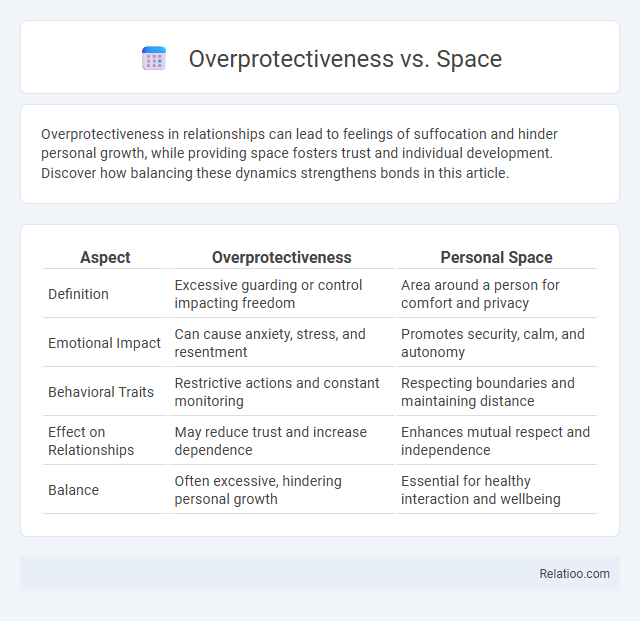Overprotectiveness in relationships can lead to feelings of suffocation and hinder personal growth, while providing space fosters trust and individual development. Discover how balancing these dynamics strengthens bonds in this article.
Table of Comparison
| Aspect | Overprotectiveness | Personal Space |
|---|---|---|
| Definition | Excessive guarding or control impacting freedom | Area around a person for comfort and privacy |
| Emotional Impact | Can cause anxiety, stress, and resentment | Promotes security, calm, and autonomy |
| Behavioral Traits | Restrictive actions and constant monitoring | Respecting boundaries and maintaining distance |
| Effect on Relationships | May reduce trust and increase dependence | Enhances mutual respect and independence |
| Balance | Often excessive, hindering personal growth | Essential for healthy interaction and wellbeing |
Understanding Overprotectiveness in Relationships
Understanding overprotectiveness in relationships involves recognizing the fine line between care and control, where excessive monitoring can hinder personal growth and trust. Providing space fosters independence and emotional safety, allowing partners to develop their identities while maintaining a healthy connection. Balancing overprotectiveness with appropriate boundaries nurtures mutual respect and strengthens the relationship's foundation.
The Importance of Personal Space
Personal space is essential for emotional well-being and healthy relationships, allowing individuals to maintain autonomy and reduce stress. Overprotectiveness can encroach on this need, leading to feelings of suffocation and resentment, while giving your loved ones adequate space fosters trust and independence. Balancing protection with respect for personal boundaries strengthens connections and supports mental health.
Signs You Might Be Overprotective
Frequent monitoring of a child's activities and excessive interference in decision-making often indicate overprotectiveness, which can hinder emotional growth and independence. Overprotective behavior may manifest as constant worry, controlling routines, or limiting social interactions, preventing the development of resilience and problem-solving skills. Recognizing these signs helps balance protective instincts with granting necessary space, fostering healthy autonomy and confidence in children.
Benefits of Allowing Space
Allowing space in relationships fosters individual growth, enhances trust, and reduces feelings of suffocation often caused by overprotectiveness. Providing personal freedom encourages healthier communication and emotional independence, leading to stronger connections. Space supports mental well-being, enabling partners to maintain their identities while nurturing the relationship.
Psychological Effects of Overprotection
Overprotectiveness often leads to increased anxiety, low self-esteem, and impaired decision-making skills in individuals due to restricted autonomy. Providing adequate space fosters emotional resilience and healthy psychological development by allowing independent problem-solving and growth. Balancing overprotectiveness with sufficient personal space is crucial to mitigate negative outcomes like dependency and social withdrawal.
Striking a Healthy Balance
Striking a healthy balance between overprotectiveness and granting space is essential for fostering independence and emotional growth. Excessive overprotectiveness can stifle development, while allowing too much space may lead to feelings of neglect or insecurity. Effective parenting involves setting clear boundaries while encouraging autonomy, promoting trust, and nurturing resilience in children.
Communication Strategies for Boundaries
Effective communication strategies for boundaries involve clearly expressing personal limits while respecting others' needs, which helps balance overprotectiveness and individual space. Establishing open dialogues encourages mutual understanding, reducing the risk of perceived control or neglect. Implementing active listening and assertive language allows both parties to feel heard and valued, promoting healthy relational dynamics.
Overprotectiveness in Parenting vs. Partnerships
Overprotectiveness in parenting often hampers children's development of independence and problem-solving skills, while in partnerships, it can lead to control issues and reduced trust between partners. Both contexts involve a delicate balance between providing security and allowing personal space, where excessive protection may cause resentment and stifle growth. Understanding the impact of overprotectiveness on emotional well-being and autonomy is essential for fostering healthy relationships and individual confidence.
When Space Turns into Neglect
Balancing overprotectiveness and space is crucial in fostering healthy relationships, as too much protection can stifle growth while excessive space may lead to neglect. You must recognize the subtle signs when giving autonomy shifts from supportive freedom to emotional or physical neglect, impacting trust and connection. Understanding this delicate boundary helps maintain a nurturing environment where your loved ones feel secure yet independent.
Building Trust Through Autonomy
Building trust through autonomy involves balancing overprotectiveness and granting personal space, which is essential for healthy relationships. Allowing individuals the freedom to make decisions fosters self-confidence and independence while minimizing feelings of suffocation caused by overprotectiveness. This equilibrium encourages open communication, mutual respect, and stronger emotional bonds.

Infographic: Overprotectiveness vs Space
 relatioo.com
relatioo.com